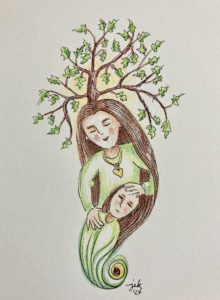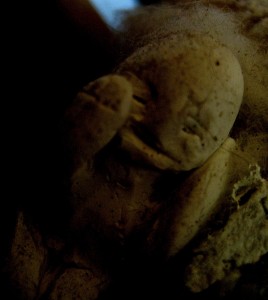
-Artwork © 2024 Jan Ketchel
Alice Miller’s books, on the impact of child abuse and neglect, evoke deep compassion for the wounded inner child. Healing from childhood trauma requires deep sensitivity and respect for dissociated child parts, along with their experiences of abuse and neglect.
Ultimately, complete healing requires full acceptance of everything one has experienced in life. With trauma, this includes releasing the full sensory and emotional discharge of stored reactions to the traumatic experience. With healing, those memories are no longer traumatic; they trigger no emotion or sensation. They are completely neutral.
Mentally, one is challenged to dispel beliefs that one was responsible for causing the traumatic encounter. Here one truly needs to accept that indeed they were a victim in an experience that was not of their making.
Healing also includes a vastly enlarged perspective of the experience, which includes the motives and circumstances of others involved in the traumatic experience. Ultimate healing also requires complete emotional neutrality toward one’s perpetrator.
To acknowledge one’s victim status is critical to healing and, yet, one cannot heal if one holds onto the victim status as an enduring identity. An enduring identity as victim reflects a personality construction with the wounded child in control of, what Winnicott called, the false self. This self is seen as false because rather than mature through the normal developmental stages of childhood, it mimicks adulthood while secretly dedicating itself to adaptive behaviors that protect the child from anxiety.
The false self is a commandeered adult ego state whose charge is to defend the child from any discomfort. The false self employs its resources to bury, in the physical body, the memory and impact of trauma, as well as to develop a rigid body armor to stave off the challenge of the outside world.
The false self often develops competency in a profession, which provides security for the child, but behind this seeming successful adaptation to life is a sense of self as a phony, threatened to be discovered at any moment.
I refer to this child state that controls the false self as the uninitiated child because it has failed to complete its rite of passage to advance beyond its victim status. Rites of passage are purposeful traumatic practices that societies once used to help children successfully advance into real adulthood. All trauma requires full recapitulation to complete passage into real adulthood.
Failure to advance can fixate the child in a narcissistic worldview of entitlement, protection and revenge. In her book, For Your Own Good: Hidden Cruelty in Child Rearing and the Roots of Violence, Alice Miller describes Hitler’s horrifically abusive childhood, that, left unprocessed, was projected outward in a ruthless quest for revenge.
These same dynamics are blatant in the cult of the child that serves the power drives of uninitiated charismatic leaders, who promise revenge upon the reigning adult authority figures in the present world. These extreme childish expectations of entitlement and protection have opened the floodgates of legitimization for the uninitiated, who blindly support these irreverent child heroes.
These extreme examples simply underscore how this developmental challenge of achieving true adulthood is the salient issue for the human race today. The hallmark of true adulthood is the acceptance of full responsibility for one’s entire life, including all experiences of victimization.
This in no way takes responsibility away from those who have victimized others. They must and will be held accountable for their actions. They will never be able to advance spiritually unless they fully feel the pain they caused and recapitulate all the pain of their own lives. These are the prerequisite rites of passage.
Ultimately, like Job, we are faced with accepting the fact that life is not fair, despite the echoes of our childhood socialization.
Ultimately, we are challenged to accept Buddha’s assessment that life is suffering. Earth School is a playing field for the suffering of attachment and loss.
The full mastery of Earth School is to arrive at the place of love, most especially for all those who had roles in our traumatic rites of passage.
Become the child acorn that advances beyond its protective shell, delivering its vitality to the mighty adult oak it was always destined to become.
Ultimately, the child’s destiny is to grow up and into its adult self, who awaits beyond its rites of passage. To that adult, bring a matured innocence, willing to journey freely in and, perhaps someday, beyond this predatory universe.
Mature the self, mature the world,
Chuck


